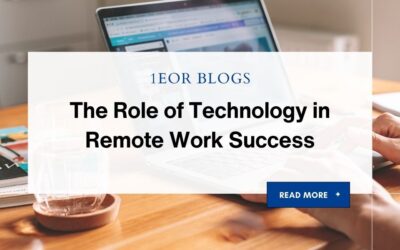In today’s globalized world, expanding into emerging markets offers tremendous growth opportunities for businesses. However, the process of entering a new market is filled with challenges, especially in countries where laws, regulations, and business practices differ widely. This is where an Employer of Record (EOR) becomes an invaluable partner, providing a streamlined, compliant, and cost-effective approach for international expansion. Working with an EOR allows companies to focus on business growth without having to manage the complexities of local compliance, hiring, payroll, and tax regulations. 1eor, known for its expertise and reliability, is among the best options for companies looking to expand into emerging markets.
What Is an EOR and How Does It Work?
An Employer of Record, or EOR, is a third-party organization that handles all the administrative and legal responsibilities associated with hiring and managing employees in a foreign country. Essentially, an EOR serves as the official employer for your international employees, while you retain control over their work and performance. Here’s how an EOR works:
- Local Hiring and Compliance: The EOR legally hires employees in the target country on behalf of the client company.
- Payroll and Taxes: The EOR manages payroll, ensuring employees are paid according to local laws.
- Legal and Regulatory Compliance: The EOR ensures compliance with all employment laws, tax requirements, and labor regulations.
With an EOR, companies can avoid the need to establish a local entity in a new market, significantly reducing time, cost, and risk.
The Importance of EORs in Expanding to Emerging Markets
Emerging markets often have high potential for growth, but they also come with challenges that established markets do not face. Emerging markets may have unique legal frameworks, unpredictable economic conditions, and different cultural practices that complicate business operations. An EOR provides an efficient solution for overcoming these obstacles, making it a valuable partner in market expansion strategies.
Key Advantages of EORs in Emerging Markets:
- Legal Compliance: EORs are experts in local employment laws, ensuring that companies comply with labor, tax, and social security regulations.
- Cost Savings: Setting up a legal entity in each new market can be costly. With an EOR, businesses can save on overhead and compliance costs.
- Reduced Risk: EORs handle the compliance aspects of hiring, helping companies avoid penalties and reputational damage associated with non-compliance.
How an EOR Can Help You Enter Emerging Markets: Key Benefits
Entering an emerging market without an EOR can be risky and time-consuming. Here’s how an EOR can help you enter emerging markets effectively:
1. Efficient Market Entry
Using an EOR allows companies to begin operations quickly by leveraging the EOR’s local expertise and infrastructure. This speeds up the process, allowing businesses to start generating revenue faster than they would if they had to establish their own entity.
2. Local Expertise and Compliance
One of the major obstacles in emerging markets is understanding and adhering to local laws and regulations. An EOR already has in-depth knowledge of the legal landscape in various markets, ensuring that your business stays compliant and avoids costly mistakes.
3. Streamlined Recruitment and Hiring
Recruiting talent in an emerging market can be challenging due to differences in language, cultural expectations, and hiring practices. An EOR manages the entire recruitment process, from finding local talent to handling paperwork, allowing companies to onboard employees smoothly and efficiently.
4. Flexible Operations without a Physical Entity
Building a local entity involves a significant investment of time and money. With an EOR, companies can bypass this step and maintain flexibility in their operations. This is especially useful for testing new markets without committing to the costs associated with a physical presence.
5. Comprehensive Payroll and Tax Management
EORs handle all aspects of payroll, ensuring employees are paid accurately and on time. They also take care of tax deductions and social security contributions, ensuring full compliance with local tax regulations. This reduces the administrative burden on the client company and eliminates payroll errors.
6. Risk Mitigation in Dynamic Market Environments
Emerging markets often experience frequent changes in labor laws and tax regulations. An EOR stays updated with these changes and ensures that your business adapts quickly. This helps mitigate risks, protecting your business from fines, legal issues, and reputational damage.
Table: Benefits of Using an EOR in Emerging Markets
| Benefit | Description |
|---|---|
| Legal Compliance | Ensures adherence to local laws and reduces legal risks |
| Cost Efficiency | Eliminates the need for setting up a local entity, saving money and time |
| Local Expertise | Provides knowledge of cultural and legal differences for smoother operations |
| Risk Mitigation | Helps navigate changes in regulations, reducing potential penalties |
| Payroll Management | Manages payroll, taxes, and benefits, ensuring compliance and accuracy |
Common Challenges of Entering Emerging Markets (And How EORs Solve Them)
Emerging markets are enticing, but they come with unique hurdles. Here’s how an EOR can help you enter emerging markets by addressing these common challenges:
1. Navigating Uncertain Legal Environments
In many emerging markets, labor laws are complex and subject to frequent changes. Compliance can be challenging for companies without an in-depth understanding of local regulations. EORs have legal experts who continuously monitor these changes, ensuring that companies stay compliant.
2. Managing Cultural Differences
Each market has its own cultural nuances, from communication styles to work ethics. An EOR with local experience helps bridge these cultural gaps by advising on best practices for hiring and managing employees in the region.
3. Ensuring Competitive Compensation and Benefits
Employee expectations for compensation and benefits vary widely across emerging markets. An EOR can provide insights into local compensation standards and structures, ensuring that companies offer competitive packages that attract top talent.
How EORs Enable a Scalable Growth Strategy
For companies looking to scale rapidly across multiple emerging markets, EORs offer an ideal solution. With an EOR, businesses can enter new markets with minimal investment and expand without the logistical challenges associated with establishing local subsidiaries. This scalable growth strategy allows companies to move into multiple markets simultaneously and adapt quickly to market demands.
Benefits of a Scalable EOR Strategy:
- Multi-country Expansion: With a single EOR, businesses can expand into several countries at once.
- Resource Optimization: Allows companies to allocate resources more efficiently, focusing on growth rather than administrative tasks.
- Enhanced Agility: EORs provide the flexibility to scale up or down based on market needs, enabling businesses to adapt quickly to changing demands.
How to Choose the Right EOR for Your Business
Choosing the right EOR partner is critical for success in emerging markets. Consider these factors when evaluating EOR providers:
- Market Coverage – Ensure the EOR has experience in the specific markets you are targeting.
- Compliance Expertise – Look for a provider with a strong understanding of local laws and regulations.
- Scalability – The EOR should support your growth objectives, enabling expansion across multiple markets as needed.
- Reputation and Reviews – Research the provider’s reputation and consider feedback from other clients.
- Cost and Transparency – Understand the cost structure and ensure there are no hidden fees.
FAQs
1. What is an Employer of Record (EOR)?
An EOR is a third-party organization that legally hires employees on behalf of a company, managing administrative tasks such as payroll, taxes, and compliance while the company oversees employee performance.
2. How does an EOR benefit companies entering emerging markets?
An EOR helps companies navigate legal compliance, cultural differences, and recruitment challenges, simplifying the process of market entry and reducing costs.
3. Can an EOR help with multiple emerging markets at once?
Yes, EORs are often equipped to support businesses across multiple countries, enabling scalable and agile expansion strategies.
4. Do I still control my employees if I use an EOR?
Yes, while the EOR is the legal employer, you retain control over employees’ day-to-day tasks and performance management.
5. How quickly can I enter a new market with an EOR?
An EOR can accelerate market entry by handling all legal and administrative setup, allowing companies to start operations in a matter of weeks.
6. Are there risks involved with using an EOR?
Using a reputable EOR significantly minimizes risks, as they handle compliance and reduce the likelihood of fines and legal issues.
7. How does an EOR handle payroll in emerging markets?
EORs manage payroll, taxes, and social contributions according to local laws, ensuring employees are paid accurately and on time.
8. Is it cost-effective to use an EOR in emerging markets?
Yes, EORs offer a cost-effective alternative to setting up a local entity, saving businesses both time and money.
Conclusion
Emerging markets hold enormous potential, but they also come with unique risks and complexities. Partnering with an EOR, such as 1eor, is a smart and effective strategy for companies looking to capitalize on the growth opportunities in these markets without bearing the full burden of local compliance, payroll, and legal complexities. An EOR helps streamline entry into new regions, ensuring that businesses remain agile, compliant, and ready to seize new opportunities.



